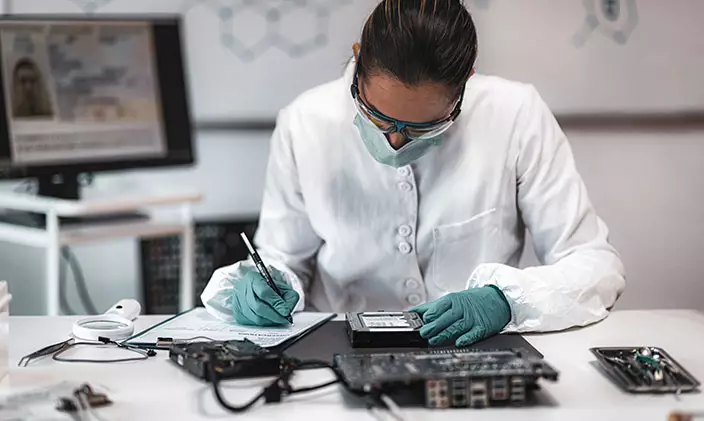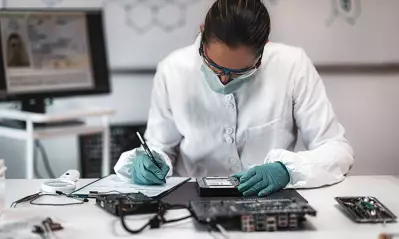What is digital forensics and why is it important?

Written by Michael Feder

Reviewed byМэKathryn Uhles, MIS, MSP,МэDean, College of Business and IT

In this article
- What is digital forensics used for?
- What steps are taken in digital forensics?
- How does someone become a digital forensics investigator?
Many people are familiar with the field of forensics, which involves collecting physical evidence from a crime scene and analyzing for clues about what happened. Digital forensics, another investigative specialty, is lesser known вҖ” wherein the вҖңcrime scenesвҖқ are computerized devices.
Computers, smartphones and embedded systems contain information about usersвҖҷ location, communications, web searches and application usage. This data can often serve as evidence in cases involving physical crimes and unlawful activity in the digital realm.
For example, a digital forensic expert can extract GPS data from a suspectвҖҷs smartphone to see their location at a specific time. They might also look at the files and code on a hackerвҖҷs computer to find evidence of security breaches or stolen data.
Because of the universal use of computerized devices, digital forensics experts are essential for investigations across law enforcement agencies. Here is an in-depth look at this growing field.Мэ
What is digital forensics used for?
Cybercrime is extremely common. In 2021, the , and potential losses from these events neared $7 billion.
The physical evidence of these crimes can be found on computers, hard drives and mobile devices. But itвҖҷs not enough to simply hold the devices in custody. Agencies need digital forensics investigators to extract data from these items to build a case. In many instances, the incriminating data is on cloud servers that must be accessed remotely.
because it can be altered or erased remotely. Digital detectives need to establish the chain of custody, which is necessary for keeping the information admissible in court.
Forensics investigators can use the data on digital devices to find out when a crime occurred, what methods were used, and who was involved. The information can lead to arrests and serve as evidence in court. Some forensics experts are even witnesses for criminal prosecutors during court cases.
Cyber investigations are also important for prevention. Digital forensics experts find out about new methods hackers use while collecting evidence. They can share these techniques with cybersecurity specialists, who can develop ways to protect against these new techniques.Мэ
What steps are taken in digital forensics?
Digital forensic investigators need to use a methodical approach in their work. Although the techniques digital investigators use can be similar to those of detectives at physical crime scenes, the tools are quite different.
Digital forensics investigations occur in a series of .
- Collection and identification вҖ” Digital forensics experts need to identify specific files or information as important to their investigation. They may search for files or inspect a deviceвҖҷs activity log to find out which software and applications the user opened. Often, investigators will know a few details about a crime and will use this knowledge to help focus their search.
- Preservation вҖ” Once they have files, devices or lines of code, investigators will protect them from being changed. This will include copying or saving the information and disconnecting devices from the internet. In addition to avoiding accidental changes, digital forensics workers want to ensure that hackers cannot remotely access the evidence to alter or erase it.
- Examination вҖ” Once the evidence is secure, investigators can examine it. The goal is to answer questions about the crime, such as who did it and when and where it happened. One example of examination could be looking at in a social media photo to find out where it was taken.
- Analysis вҖ” Digital forensics cases often involve many different pieces of data. Investigators need to analyze them together to build a more complete picture of the criminal activities.
- Building a case вҖ” The final step is to document the findings so that other investigators and legal experts can find the perpetrators and build a case against them.
What can be learned through digital forensics?
With cybercrimes, the investigation usually starts on the victimвҖҷs computer or network, where forensics experts can learn the source and methods of the attack.
Hackers often display a pattern of activity when carrying out an attack. These digital footprints can serve as evidence or lead investigators to incriminating files, devices or software.
What is the difference between computer forensics and digital forensics?
The terms computer forensics and digital forensics are often used interchangeably. Both fields are closely related because they deal with computerized devices. However, computer forensics typically deals with desktops, laptops, servers and hard drives.
Because of the prevalence of these systems, digital forensics experts are often part of investigations for both physical crimes and cybercrimes.
What is a digital forensics investigator?
Digital forensics investigators are computer scientists who use their skills to find and collect evidence from computers, mobile phones, tablets and other digital devices. They coordinate with attorneys and other investigators to collect evidence and locate those responsible for criminal activities.
In some cases, digital forensics experts play a specific role, such as extracting information from a suspectвҖҷs mobile phone. However, they may be the primary investigators in cases involving cybercrime.
What techniques do digital forensics investigations use?
Digital forensics investigators use specific techniques to carry out their inquiries. Here are some cyber investigators use:
- вҖ” Forensic experts use special software to examine the contents of devices and files.
- Network analysis вҖ” Investigators often look at traffic and activity history on a network.
- File recovery вҖ” Investigators usually need to find and recover deleted files, which is often possible with the help of software.
- Live analysis вҖ” This involves collecting information, such as software, files and metadata, from a device while itвҖҷs running. It can also include collecting encrypted files for later decryption.
- Malware forensics вҖ” This focuses on finding and examining malware programs on a system to get information about their origin.
- ISP and file monitoring вҖ” In some cases, forensics experts can locate suspects by allowing them to access a compromised file or network and then tracking them digitally.Мэ
How does someone become a digital forensics investigator?
There are several ways to start a career as a digital forensics investigator. All career paths begin with obtaining the necessary technical knowledge and learning investigative techniques and requirements.
Education requirements
Most employers expect digital forensics investigators to have a . An information technology (IT) or cybersecurity degree will teach you skills to work in this field, with a computer science degree serving as a possible alternative.
Necessary skills
Digital forensics investigators need a wider range of skills than other tech professionals.
- Technical abilities are essential. You need to understand computer and device systems and be able to see lines of malicious code or metadata among pages of unimportant code.
- Attention to detail is a vital attribute. Again, a single line of code could hold the key to solving a case and finding a suspect.
- Deduction skills are important. Despite working on computers instead of in the field, digital forensics specialists are still investigators whose primary job is to solve a crime using logic and deductive reasoning.
- Communication is a part of every investigatorвҖҷs job. Whether you work with other cyber investigators, field agents or prosecutors, you need to coordinate your activities with them so that you are all working toward a common goal: solving the case.
A combination of experience and education is necessary to succeed as a digital forensics investigator.Мэ
Cybersecurity and IT education at °ДГЕМмМмІКҝӘҪұјЗВј
Whether youвҖҷre seeking to gain a basic understanding of cybersecurity and other IT skills or youвҖҷre a working professional looking to expand your knowledge, °ДГЕМмМмІКҝӘҪұјЗВј offers online course collections and bachelorвҖҷs degrees.
- вҖ” This course collection can help you prepare to sit for the EC-Council Certified Ethical Hacker (CEH) certification exam. Topics include the phases of ethical hacking, recognizing weaknesses and vulnerabilities of a system, social engineering, IoT threats, risk mitigation and more.
- Computer Hacking Forensics Investigator Course Collection вҖ” This course collection can help you prepare to sit for the EC-Council Computer Hacking Forensics Investigator (CHFI) certification exam.МэYouвҖҷll learn about the latest technologies, tools and methodologies in digital forensics, including dark web, IoT, malware, cloud and data forensics.
- Cybersecurity Digital Forensics Certificate вҖ“ Ideal for students with a cybersecurity background, this certificate program covers methods for planning, implementing and monitoring security measures.
- Bachelor of Science in Cybersecurity вҖ” This online program teaches skills such as security policies, network security, cybersecurity and more.
- Bachelor of Science in Information Technology вҖ” Learn skills pertaining to information systems, system analysis, operations and cybersecurity.

ABOUT THE AUTHOR
A graduate of Johns Hopkins University and its Writing Seminars program and winner of the Stephen A. Dixon Literary Prize, Michael Feder brings an eye for detail and a passion for research to every article he writes. His academic and professional background includes experience in marketing, content development, script writing and SEO. Today, he works as a multimedia specialist at °ДГЕМмМмІКҝӘҪұјЗВј where he covers a variety of topics ranging from healthcare to IT.

ABOUT THE REVIEWER
Currently Dean of the College of Business and Information Technology,МэKathryn Uhles has served °ДГЕМмМмІКҝӘҪұјЗВј in a variety of roles since 2006. Prior to joining °ДГЕМмМмІКҝӘҪұјЗВј, Kathryn taught fifth grade to underprivileged youth in Phoenix.
This article has been vetted by °ДГЕМмМмІКҝӘҪұјЗВј's editorial advisory committee.Мэ
Read more about our editorial process.
Мэ
want to read more like this?


